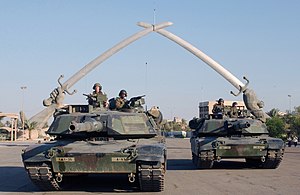Criticism of the Iraq War
Most significantly, critics have assailed the U.S. and its allies for not devoting enough troops to the mission, not adequately planning for post-invasion Iraq, and for permitting and perpetrating widespread human rights abuses.
Professor Chip Pitts asserts that an American empire exists, but argues that it is profoundly at odds with better instincts of US citizens and policymakers, and that rejecting neo-colonialism by military means as employed in the Iraq War is a prerequisite to restoring domestic civil liberties and human rights that have been infringed upon by an imperial presidency – while crucial, as well, to promoting peace and stability in the Middle East and other places of vital US interest.
"[8] Furthermore, before the invasion even the then UK Attorney General, Lord Goldsmith, advised that the war would likely be illegal for several reasons including the lack of a Security Council resolution.
Soon after the invasion, former U.S. Deputy Secretary of Defense Paul Wolfowitz, a leading architect of the war, acknowledged that the U.S. made assumptions related to the insurgency that "turned out to underestimate the problem.
"[21] Critics have particularly chastised the Pentagon, which was charged with preparing for the post-invasion period, for largely ignoring a $5 million study entitled the Future of Iraq Project, which the U.S. State Department compiled in the year preceding the invasion.
[25][26][27] As the war bill grew, many U.S. politicians, including some who supported the invasion, begun to argue its cost outweighed its benefits, and that it was jeopardizing the preparedness of the U.S. military.
For example, on March 29, 2007, Nebraska senators and longtime rivals Chuck Hagel (R-NE) and Ben Nelson (D-NE) released a joint statement saying that "there is now a 'significant' risk that the United States military will not be able to respond to an emerging crisis.
"[28][29] During the run-up to the invasion a group of 33 international relations scholars took out a full-page ad in The New York Times suggesting, among other things, that invading Iraq would distract the United States from its fight against al-Qaeda and further destabilize the Middle East.
"[31] The International Institute for Strategic Studies agreed, saying in late 2003 that the war had swollen the ranks of al-Qaida and galvanised its will by increasing radical passions among Muslims.
The war reinvigorated radical Islamist militants in the region, set back women's rights, and weakened an already precarious healthcare system".

